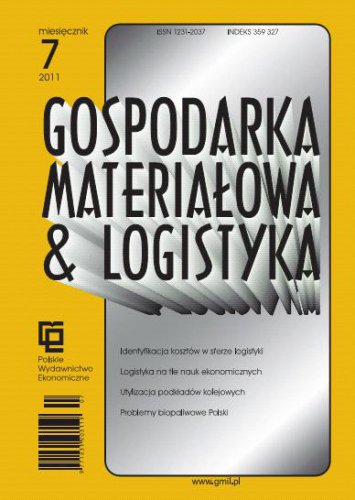Gospodarka Materiałowa i Logistyka nr 07/2011
Publication date: 2011
Place publication: Warszawa
Binding: paperback
„Gospodarka Materiałowa i Logistyka” 7/2011
Spis treści
Piotr Blaik
Identyfikacja kosztów w sferze logistyki.
Metody – tendencje – struktury – doświadczenia
Rozwój i wdrażanie zarządzania procesami i systemami logistycznymi pociąga za sobą potrzebę unowocześniania i pogłębienia identyfikacji i kwantyfikacji ogólnego poziomu i struktury kosztów w sferze logistyki. W artykule przedstawiono procedury, zakres i wyniki badań poziomu kosztów logistyki, prowadzonych w skali światowej. Wykazują one znaczne zróżnicowanie, spowodowane m.in. różnym traktowaniem w praktyce istoty i zakresu logistyki oraz stanem jej wdrożenia, przyjętą metodą rachunku kosztów, stopniem wyodrębnienia kosztów logistyki w układzie funkcji, faz tworzenia wartości, czy też odmiennością warunków funkcjonowania przedsiębiorstw w poszczególnych krajach itp.
Logistics costs identification. Methods – trends – structures – experiences
The development and implementation of logistics processes and systems management lead to modernizing and broadening of identification and quantification concerning logistics costs level & structure. The article points at the procedures and scope of world-wide research in the field of logistics costs as well as the results of the research. The research results described in the article are very differentiated. The reasons of this differentiation are: distinctive approaches to business practices responding to logistics costs nature and scope perception, various logistics concept implementation levels, cost calculation methods applied in companies, the extent of logistics cost identification in functional aspect, value creation stages, different business circumstances in particular countries, etc.
Marek Ciesielski
Logistyka na tle nauk ekonomicznych
Niski poziom integracji badań i publikacji między subdyscyplinami nauk ekonomicznych w Polsce hamuje postęp naukowy. Można to wykazać, analizując paradygmaty czterech subdyscyplin: logistyki, marketingu, zarządzania strategicznego i międzynarodowych stosunków gospodarczych. Przykładowo w każdej z tych subdyscyplin inaczej ujmuje się jedną z podstawowych cech współczesnej gospodarki: sieciowość. Wynika stąd oczywisty postulat integracji owych czterech subdyscyplin, a być może wszystkich subdyscyplin nauk o zarządzaniu. Nie można bowiem nadal tolerować sytuacji, w której subdyscypliny nauk ekonomicznych rozwijają się w izolacji – bez uwzględnienia dorobku innych fragmentów nauk ekonomicznych.
Logistics on the background of economic sciences
Low level of integration of research and publications between economics sub-disciplines in Poland inhibits scientific progress. This can be proved by analyzing the paradigms of four sub-disciplines: logistics, marketing, strategic management and international business relations. For example, in each of these sub-disciplines otherwise recognized is one of the basic features of the modern economy: a network. It follows an obvious demand for the integration of these four sub-disciplines, and perhaps of all sub-disciplines of management science. We cannot continue to tolerate a situation in which a sub-discipline of economics develop in isolation – without taking into account the heritage of other parts of economic science.
Lidia Danik, Piotr Danik, Bartosz Miszkiewicz
Utylizacja podkładów kolejowych
Ze względu na wieloletnie zaniedbania polska infrastruktura kolejowa jest w złym stanie i wymaga remontów. Stare podkłady kolejowe traktowane są przez prawo jako odpady niebezpieczne i wymagają utylizacji., o ile nie zostanie wykazane, że stężenie substancji niebezpiecznych jest odpowiednio niskie. Nawet jeżeli podkłady zostaną sklasyfikowane jako odpad nie niebezpieczny, mogą one być szkodliwe dla zdrowia i dlatego wprowadzono szereg ograniczeń ich zastosowania. Przedstawiciele branży kolejowej mają tymczasem wątpliwości co do procedury, w wyniku której podkład kolejowy przestaje być odpadem niebezpiecznym.
The utilization of railway sleepers
Due to many years of neglect, the Polish railway infrastructure is in a bad condition and needs renovation. According to the law, the old railway sleepers are treated as hazardous waste and require utilization, unless it is proven, that the concentration of dangerous substances is low enough. Even if the sleepers are classified as not dangerous waste, they still can be harmful for the health and that is why the whole range of restrictions of their application has been introduced. Meanwhile the representatives of the railway branch are having doubts concerning the procedure whose result is to show that the sleepers are not harmful.
Adam Kupczyk, Grażyna Wasiak, Monika Madej, Jarosław Osiak
Problemy biopaliwowe Polski
Biopaliwa transportowe objęte są szeregiem uregulowań międzynarodowych i krajowych, fiskalno-prawnych i normatywnych. Ostatnio weszła w życie nowa dyrektywa 2009/28/EC, która zastąpiła dyrektywy 2001/77/EC i 2003/30/EC. Stawia ona przed biopaliwami transportowymi nowe wyzwania, związane głównie ze zrównoważonością i redukcją emisji CO2.
Poland’s biofuel problems
Biofuels for transport are covered by a number of international and national, fiscal and legal, as well as normative regulations. Recently the Directive 2009/28/EC have come into force and replaced the previous Directives 2001/77/ES and 2003/30/EC. This new Directive raises new challenges for the biofuels concerning mainly the balance and emission of CO2.
EDUKACJA EKONOMICZNA
Alina Szypulewska-Porczyńska
Specjalizacje krajów UE w działalności usługowej
W 2007 r. Komisja Europejska wyłoniła najważniejsze sektory pod kątem bieżącego i przyszłego wzrostu gospodarczego oraz zdolności innowacyjnej gospodarki UE. Większość wskazanych wówczas jako priorytetowe to sektory usługowe. Do najważniejszych zaliczono sektory usługowe o znaczącym udziale w tworzeniu produktu i miejsc pracy w UE oraz silnie powiązane z resztą gospodarki, zwłaszcza jeśli chodzi o rozwój i rozprzestrzenianie technologii informatyczno-telekomunikacyjnych.
EU national specialisation in services
In 2007, the European Commission identified sectors offering the greatest benefits in terms of current and future economic growth and EU innovative potential. The majority of the selected sectors were from the service industry. Key services markets were those which contributed most in creation of value added and jobs as well as being strongly linked with the rest of economy by development and diffusion of IT technologies.
| Odbiór osobisty | 0 € |
| Kurier Inpost | 4 € |
| Kurier FedEX | 4 € |
| Inpost Paczkomaty | 4 € |
| Free delivery in Reader's Club | from 47 € |

